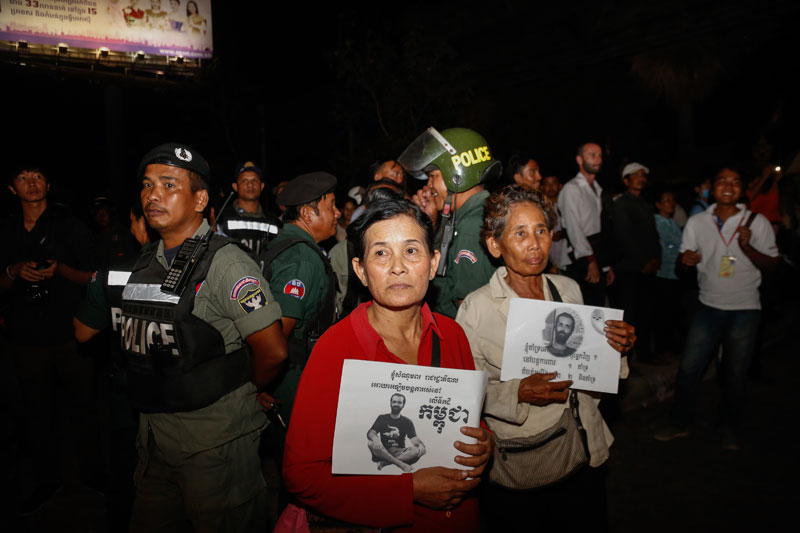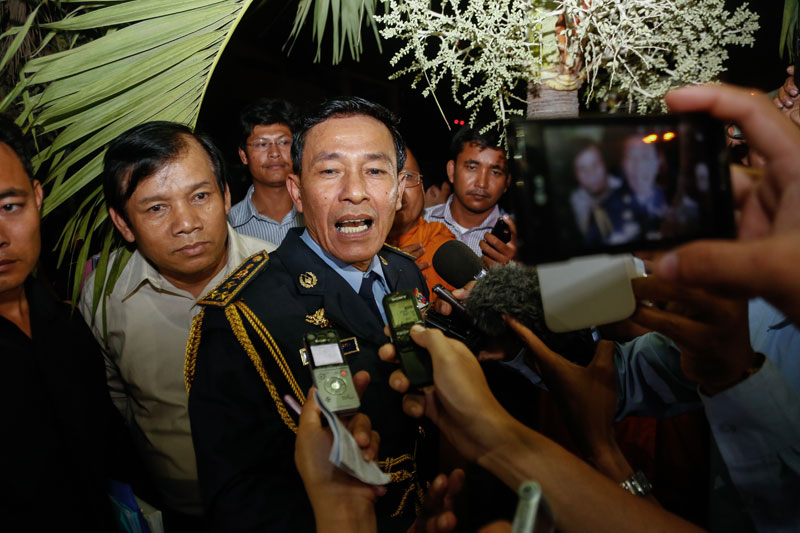Immigration officials put outspoken environmental activist Alex Gonzalez-Davidson on a one-way flight back to Spain last night, only hours after Prime Minister Hun Sen publicly called on the tireless anti-dam campaigner to leave the country.
“He is on the plane. He flies to Bangkok tonight,” Interior Ministry spokesman Khieu Sopheak said by telephone.

In a text message purportedly from Mr. Gonzalez-Davidson sent at 8:32 p.m., the activist said the government was sending him a good deal further.
“In the plane now, ready to take off,” the message said. “Free flight to Madrid, courtesy of the kingdom of wonder.”
The government refused to renew the Spanish national’s visa—which expired Friday—over an illegal roadblock he and his NGO, Mother Nature, set up in Koh Kong province that briefly blocked a government convoy on its way to the site of a proposed hydropower dam in September. The group opposes the dam, which would force hundreds of ethnic minority families off their ancestral land and flood the habitat of several threatened or endangered species.
Mr. Gonzalez-Davidson and his supporters say the government wants him out of the way because he has succeeded in stalling the project, which has the backing of ruling party Senator Lao Meng Khin and the public support of Mr. Hun Sen.
Following the activist’s arrest on Phnom Penh’s riverside shortly after noon on Monday, General Sopheak said Mr. Gonzalez-Davidson’s steadfast refusal to leave Cambodia voluntarily meant he would not be allowed back. After Mr. Gonzalez-Davidson boarded his flight out of the country, however, the general was more circumspect.
With an official expulsion order from the Interior Ministry on the record, he said, “It means it’s difficult to come back to Cambodia…. I do not say 100 percent that he cannot come back, but I think difficult.”
Mr. Gonzalez-Davidson’s deportation had been looming for days.
When the Interior Ministry said last week that it would not renew his visa, rights groups, unions and several monks rallied to the activist’s side, urging the government to reverse course. Opposition leaders Sam Rainsy and Kem Sokha sent letters on his behalf to the Interior Ministry, National Assembly and King Norodom Sihamoni.
None of it worked.

Just hours before Mr. Gonzalez-Davidson’s arrest Monday, Mr. Hun Sen said in a speech the case was a matter of national sovereignty.
“I hope the politicians can understand,” the prime minister said at a university graduation ceremony in Phnom Penh. “No matter who you are, this is a sovereign state. We are not allowed to enter other countries without a visa. They will arrest and deport us if the visa expires. So how can we be a sovereign state if we are violated?”
Mr. Gonzalez-Davidson, who speaks fluent Khmer and has lived in Cambodia for 12 years, has said that he considers himself Cambodian and dismissed the idea of his deportation as nonsensical. But Mr. Hun Sen, drawing on Cambodia’s decades-old entanglements with the U.S., said Monday that foreigners professing a love for the country were not to be trusted.
“I want to send a message to some politicians to please be clear that no foreigner loves the Khmer more than the Khmer love themselves,” he said. “Americans pretended to love the Khmer more than the Khmer loved Khmer in order to topple Samdech Preah Norodom Sihanouk. There are just a few more days until the 45th anniversary of the coup.”
The U.S. backed the regime that voted out then-Prince Sihanouk as head of state in 1970.
In a statement, Mother Nature said it “deplored” its director’s arrest and accuses the government of violating the 37-day grace period it claims the activist had by law after his visa expired.
“This sends a powerful message to the international community that all foreigners working in Cambodia risk denial of visa or the threat of deportation for criticism of the government,” it said. “It sets a dangerous precedent which further erodes Cambodia’s already shaky democratic freedoms.”
The last known high-profile case of the government deporting a foreigner over an expired visa was in 2005, when the U.K.-based environmental watchdog Global Witness was expelled from the country over its reports of police and military complicity in the country’s rampant illegal logging trade. A government report at the time accused the group of calumny.
In its statement, Mother Nature said its work would go on with or without its director in the country.
“Even without Alex we will continue to fight the Areng dam and call upon all nature activists in Cambodia and internationally to join our struggle,” it says.
“The struggle to stop the Chinese Sinohydro Group from constructing the Chhay Areng hydroelectric dam in Cambodia’s pristine Cardamom Mountain Protected Forest will continue.”
The government has downplayed the project’s potential environmental fallout while promoting its likely benefits, including jobs for locals and lower electricity bills.
It has vowed to green-light the project only if ongoing impact assessments warrant it. But opponents are wary, given that the government has already started talking to the families in the valley about relocation and that Sinohydro has signed a deal with a construction company.
Spain does not have an embassy in Cambodia.
The European Union’s ambassador to Cambodia, Jean-Francois Cautain, said his delegation would not comment on the consular issues of member states, including Mr. Gonzalez-Davidson’s deportation, but added that the E.U. supported an open and transparent debate about the effects of infrastructure projects.
“The E.U. believes that [the] environmental and social impact of infrastructure projects should be thoroughly assessed and shared, and gives way to an inclusive debate among all stakeholders to identify the best possible solutions for the development of Cambodia and the livelihood of all Cambodian people,” he said.
(Additional reporting by Hul Reaksmey)



